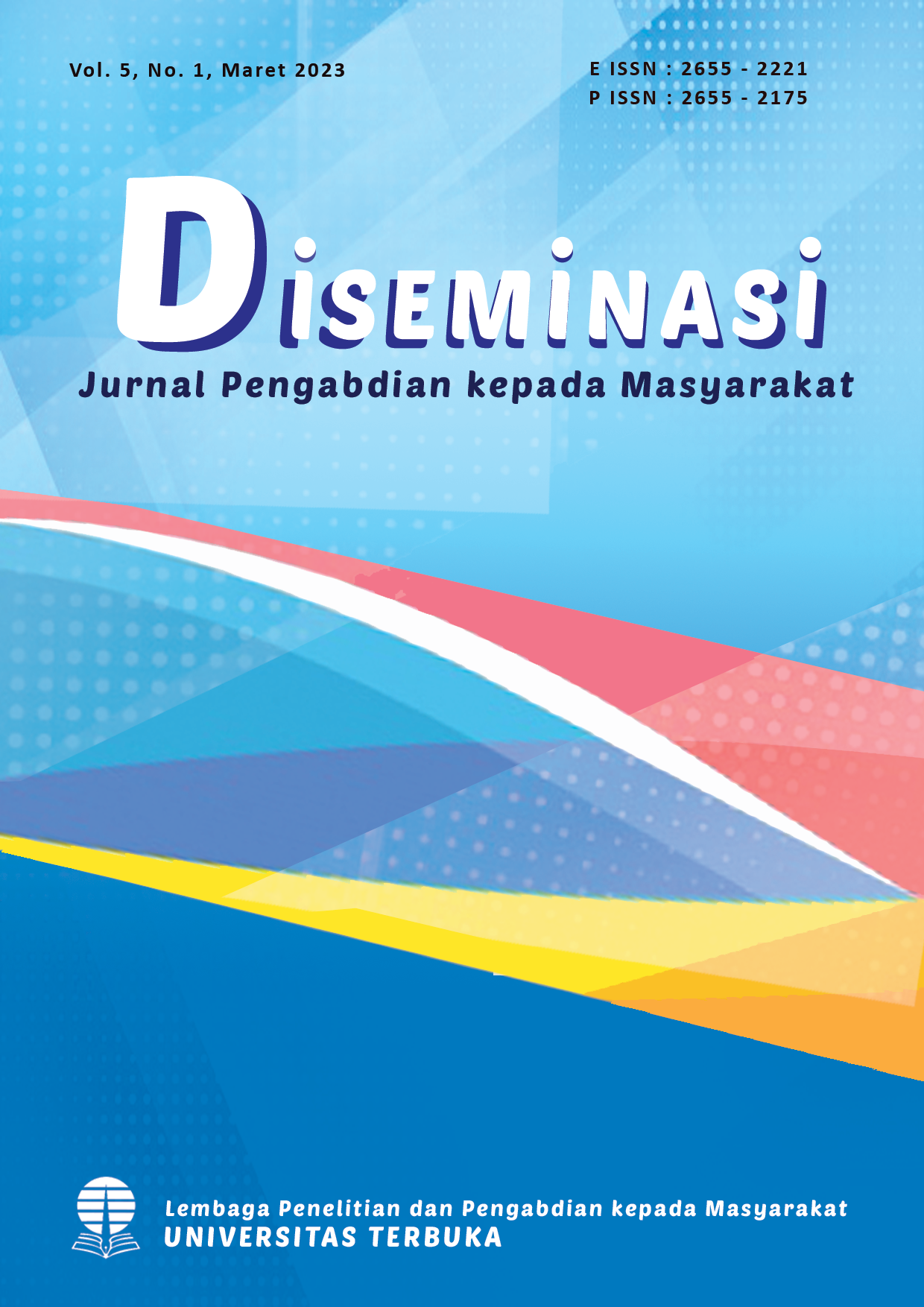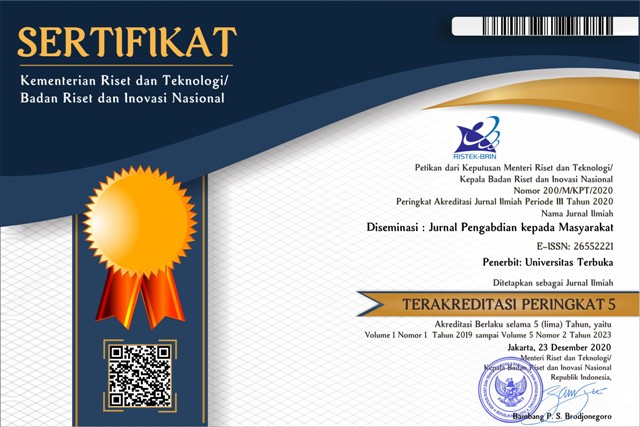MOOCS PARENTING SEBAGAI UPAYA PELIBATAN ORANGTUA PADA PENDIDIKAN ANAK INDONESIA
DOI:
https://doi.org/10.33830/diseminasiabdimas.v5i1.5045Keywords:
MOOCs, ParentingAbstract
Various parties, especially parents, can carry out children's education. Education by parents is included in
the informal channel. To properly educate children, parents need to receive adequate provisions so that
parents can educate and care for their children based on their needs and the development of children. This
provision can be provided in various formats, including online training packaged as Massive Open Online
Courses (MOOCs) Parenting. MOOCs Parenting, prepared by the ECE-UT study program team, consists
of 6 main topics: child growth and development, healthy eating, the concept of playing in children, playing
time, discipline, and effective discipline. For each subject, a discussion space is provided to discuss the
topic according to the time allotted. In addition, independent exercises and formative tests are also offered
in each case as feedback to participants on the issues raised. At the end of the Moocs session, a
competency test was given, which consisted of 20 objective questions that tested participants' mastery of
the six previous topics. Participants who actively complete all issues and take competency tests will receive
a certificate. In 2022, Moocs parenting has been opened starting in July 2022 and is being attended by 119
participants. Currently, some participants have been able to complete the MOOCs online training and are
entitled to a certificate. At the end of the session, a MOOCs evaluation form was also prepared, which was
helpful for managers in ECE-UT study programs to make improvements to Moocs Parenting from time to
time.
Key words: MOOCs, Parenting
ABSTRAK
Pendidikan anak dapat dilakukan oleh berbagai pihak, terutama orang tua. Pendidikan oleh orang tua ini
termasuk dalam jalur informal. Agar dapat mendidik anak dengan tepat, orang tua perlu mendapat
pembekalan yang memadai, agar orang tua dapat mendidik dan mengasuh anaknya berdasarkan
kebutuhan dan perkembangan anak. Bekal ini dapat disediakan dalam berbagai format, antara lain melalui
pelatihan daring yang dikemas dalam bentuk Massive Open Online Courses (MOOCs) Parenting. MOOCs
Parenting yang disiapkan tim prodi PGPAUD UT terdiri dari 6 topik utama yaitu pertumbuhan dan
perkembangan anak, makan sehat, konsep bermain pada anak, waktu bermain, disiplin, disiplin efektif.
Pada setiap topik disediakan ruang diskusi untuk membahas topik sesuai waktu yang disediakan. Selain itu
juga disediakan latihan mandiri dan tes formatif pada tiap topik, sebagai umpan balik pada peserta terhadap
topik yang diangkat. Pada akhir sesi MOOCs diberikan uji kompetensi yang terdiri dari 20 soal objektif yang
menguji penguasaan peserta terhadap keenam topik sebelumnya. Peserta yang aktif menyelesaikan semua
topik dan mengerjakan uji kompetensi akan mendapatkan sertifikat. Pada tahun 2022 ini, MOOCs parenting
telah dibuka mulai bulan Juli 2022, dan diikuti 115 peserta. Saat ini, sebagian peserta telah mampu
menyelesaikan pelatihan daring MOOCs dan berhak mendapatkan sertifikat. Pada akhir sesi juga disiapkan
form evaluasi MOOCs yang berguna bagi pengelola di prodi PGPAUD UT untuk melakukan penyempurnaan
MOOCs Parenting ini dari waktu ke waktu.
References
Alzahrani, K. M., & Meccawy, M. (2021). MOOCs One-Stop Shop: A Realization of a Unified
MOOCs Search Engine. {IEEE} Access, 9, 160175–160185.
https://doi.org/10.1109/access.2021.3130841
Amini, M. (2017). Implementation of Parenting Education Program in Kindergarten. IJECES, 6(2).
https://doi.org/https://doi.org/10.15294/ijeces.v6i2.20240
Astuti, S. P., Hartiinah, S., & KW, S. (2021). Perbedaan Emosional Orang tua yang Memahami
ITdengan Tidak Memahami IT dalam Mendampingi Belajar dari Rumah pada Peserta Didik
Anak Kelas VII di SMP NEgeri 4 Kota Tegal. JCOSE Jurnal Bimbingan Dan Konseling, 4(1),
–28. https://doi.org/10.24905/jcose.v4i1.88
Chasanah, S. U. (2019). Parenting Orang Tua Wali Murid di PAUD Terpadu Jogja Citra
Banguntapan Bantul. DIMAS: Jurnal Pengabdian Masyarakat, 1(1).
https://doi.org/10.47317/dmk.v1i1.145
Chauhan, A. (2015). Beyond the Phenomenon. In Macro-Level Learning through Massive Open
Online Courses ({MOOCs}) (pp. 119–140). {IGI} Global. https://doi.org/10.4018/978-1-4666-
-2.ch007
Isnaini, I. D., Julianingsih, D., & Aryanti, M. P. (2022). Sosialisasi Pola Asuh yang Tepat dan
Pentingnya Memahami Karakteristik Anak Usia Dini di TK Dharmawanita Gedangan. Bima
Abdi: Jurnal Pengabdian Masyarakat, 2(2), 1–8. https://doi.org/10.53299/bajpm.v2i2.174
Lammenett, E. (2021). Facebook und Instagram. In Praxiswissen Online-Marketing (pp. 417–435).
Springer Fachmedien Wiesbaden. https://doi.org/10.1007/978-3-658-32340-0_14
Panyahuti, P. (2022). Validity Test of Motion Graphics Media as A Wide Area Network Learning
Media. Jurnal Teknologi Informasi Dan Pendidikan, 15(1), 21–27.
https://doi.org/10.24036/jtip.v14i3.572
West, D. M. (2018). Effective Ads and Social Media Promotion. In Air Wars: Television Advertising
and Social Media in Election Campaigns, 1952{textendash}2016 (pp. 11–24). {CQ} Press.
Downloads
Published
Issue
Section
License
Copyright and Licensing

Diseminasi : Jurnal Pengabdian kepada Masyarakat is licensed under a Creative Commons Attribution-NonCommercial-NoDerivativeWorks 4.0 International License. Allows users to copy and distribute the Article, provided this is not done for commercial purposes and further does not permit distribution of the Article if it is changed or edited in any way, and provided the user gives appropriate credit (with a link to the formal publication through the relevant DOI), provides a link to the license, and that the licensor is not represented as endorsing the use made of the work.















